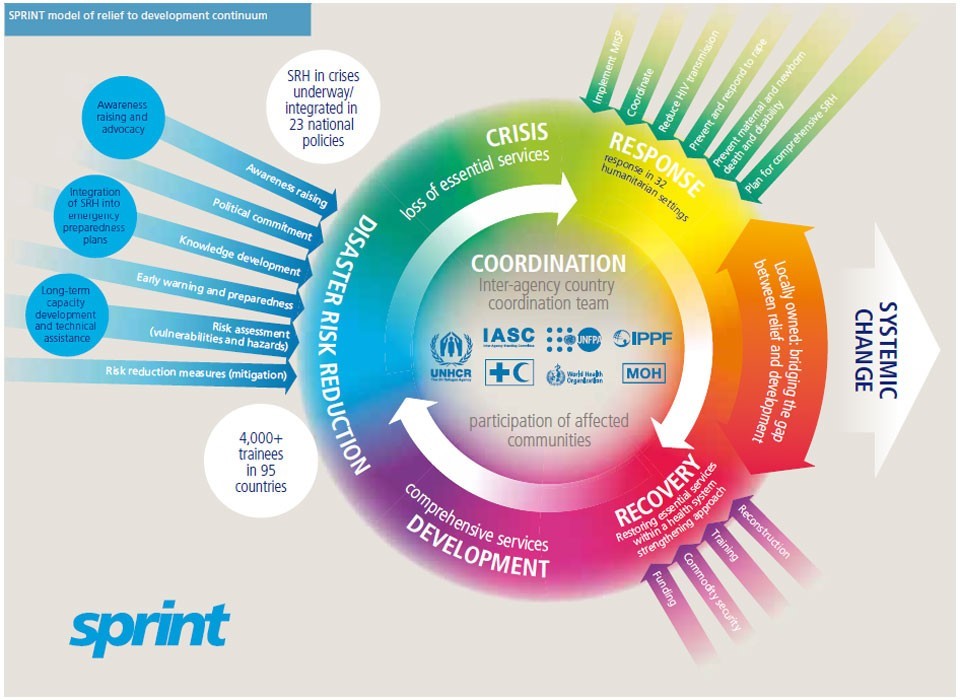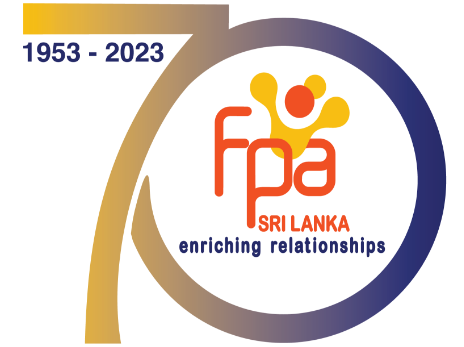SPRINT PROJECT

SPRINT was designed to address gaps in the implementation of The Minimum Initial Service Package (MISP) for Reproductive Health which is a set of priority activities to be implemented at the onset of an emergency. The gaps were identified in a global evaluation undertaken in 2004 by the IAWG [The Inter Agency Working Group on Reproductive Health in Crises (IAWG)] formed in 1995 to develop guidance on addressing sexual and reproductive health (SRH) for refugees, internally displaced people and other affected by emergencies.
The SPRINT Initiative provides one of the most important aspects of humanitarian assistance that is often forgotten when disaster and conflicts strike. Ensuring access to essential life-saving SRH services for women, men and children in times of crises, a time when services are most needed yet are not prioritised or recognised by key humanitarian responders, SPRINT delivers practical solutions for girls and women, trains humanitarian workers to deal with pregnancy, childbirth, reproductive health and the aftermath of rape and violence.
Besides working to ensure emergency humanitarian programs in the field respond to such needs, SPRINT engages in political processes, working towards raising awareness, strengthening coordination, and building capacities to provide SRH services in crises. Saving lives is the core of the SPRINT Initiative. SPRINT Initiative is funded by the Department of Foreign Affairs and Trade (DFAT) under Australian Government and managed by International Planned Parenthood Federation (IPPF).
GOALS
The goal of The MISP is to reduce mortality, ill-health and disability through the application of a set of clinical interventions provided using an agreed approach and set of guidelines to meet SRH needs in emergencies.
NEEDS & GAPS
A comprehensive International Framework exists endorsing the need for SRH in crises and The MISP is an internationally accepted minimum standard of care. Much remains to be done to ensure the availability of skilled health workers and the services needed to meet critical SRH needs in crises. SPRINT is at the forefront of addressing these needs and gaps.
HOW SPRINT WORKS
SPRINT Initiative’s activities are carried out by IPPF member associations, Ministries of Health (MOH), international and local relief organisations as well as UN agencies. The Initiative is coordinated by IPPF South Asia through a secretariat at the Regional Office in partnership with the other regions and the Humanitarian Response Branch of UNFPA. When successfully implemented as soon as a humanitarian crisis occurs, the sexual and reproductive health services set out in The MISP can mean the difference between life and death or disability for those affected by the disaster.
OBJECTIVES -SPRINT IMPLEMENTATION IN SRI LANKA (FROM APRIL TO SEPTEMBER 2015 - INITIAL PHASE)
- Advocacy meetings to be conducted with participants from key players in humanitarian response and action such as UN agencies, national and international NGOs and government partners for DRR and emergency preparedness for the inclusion of MISP in strategies and/or policy.
- To increase national capacity to coordinate the implementation of the Minimum Initial Services Package (MISP) in humanitarian settings, it is also proposed to conduct a National Level Workshop on Minimum Initial Service Package during the project period.
- Conduct a SRH Situational Assessment in the country on the status of SRH and MISP implementation.
- It is also proposed that during the quarterly CCT meeting, the CCT Work plan will also be updated on a periodic basis and based on the emerging needs in the country.
- Under Emergency Preparedness, as one of the major components of SPRINT, it is planned to include MISP into the curriculum of Public Health Professionals, doctors and nurses, hence FPA Sri Lanka would conduct meetings and facilitate in drafting of the curriculum.
With regards to above, as of July 2016, we have only achieved objective number 3 and others are yet to be implemented (By 30th September 2016)

.png)

